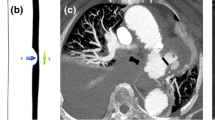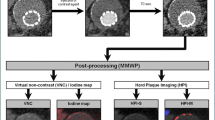Abstract
Acute aortic syndromes and traumatic aortic injury are often diagnosed on CT angiography, possibly requiring emergent intervention. Advances in handheld computing have created the possibility of viewing full DICOM datasets from a remote location. We evaluated the ability to diagnose and characterize acute aortic pathologies on CT angiograms of the thorax using an iPhone-based DICOM viewer. This study was performed after Institutional Review Board approval. Fifteen CT angiograms of the thorax in suspected acute aortic syndromes were evaluated by three blinded radiologists on a handheld device using a DICOM viewer. Studies were evaluated for the ability to identify and classify aortic dissection, transection, or intramural hematoma, measure aortic dimensions, and identify mediastinal hematoma, arch variants, and pulmonary pathology. Studies were compared to blinded interpretations on a dedicated PACS workstation. The aortic pathology was correctly identified as aortic transection/pseudoaneurysm (n = 5), type A dissection (n = 2), and type A intramural hematoma (n = 1) by all reviewers, with no false-positive interpretations. This represents a sensitivity and specificity of 100 %. Mediastinal hematoma (n = 6), pneumothorax (five right, three left), and arch vessel involvement (n = 2) were identified in all cases. There was 88.5 % accuracy in identifying arch variants. Measurement of the size of the involved aortic segment was similar on handheld device and PACS workstation; however the adjacent normal aorta was 1.2 ± 1.0 mm larger on the handheld device (p = 0.03). Handheld DICOM viewers may be useful for emergent consultations and triage, and may expedite preprocedure planning to reduce the time interval between diagnostic scan and therapeutic intervention.


Similar content being viewed by others
References
Parker MS, Matheson TL, Rao AV, Sherbourne CD, Jordan KG, Landay MJ et al (2001) Making the transition: the role of helical CT in the evaluation of potentially acute thoracic aortic injuries. AJR Am Journal Roentgenol 176(5):1267–1272
Hardie AD, Wineman RW, Nandalur KR (2009) The natural history of acute non-traumatic aortic diseases. Emerg Radiol 16(2):87–95
Hayter RG, Rhea JT, Small A, Tafazoli FS, Novelline RA (2006) Suspected aortic dissection and other aortic disorders: multi-detector row CT in 373 cases in the emergency setting. Radiology 238(3):841–852
Steenburg SD, Ravenel JG, Ikonomidis JS, Schönholz C, Reeves S (2008) Acute traumatic aortic injury: imaging evaluation and management. Radiology 248(3):748–762
Yeow TN, Raju VM, Venkatanarasimha N, Fox BM, Roobottom CA (2011) Pictorial review: computed tomography features of cardiovascular emergencies and associated imminent decompensation. Emerg Radiol 18(2):127–138
Sangster GP, González-Beicos A, Carbo AI, Heldmann MG, Ibrahim H, Carrascosa P et al (2007) Blunt traumatic injuries of the lung parenchyma, pleura, thoracic wall, and intrathoracic airways: multidetector computer tomography imaging findings. Emerg Radiol 14(5):297–310, Springer-Verlag
Yee J, Hung RK (1999) Spiral CT angiography of aortic dissection. Emerg Radiol 6(1):24–31
Thoongsuwan N, Stern EJ (2002) Chest CT scanning for clinical suspected thoracic aortic dissection: beware the alternate diagnosis. Emerg Radiol 9(5):257–261
Stabile Ianora AA, Midiri M, Chiumarulo L, Scardapane A, Strada A, Angelelli G et al (2001) Helical CT: a useful technique in the evaluation of aortic intramural hematoma. Emerg Radiol 8(6):320–325
Dake MD, Kato N, Mitchell RS, Semba CP, Razavi MK, Shimono T et al (1999) Endovascular stent-graft placement for the treatment of acute aortic dissection. N Engl J Med 340(20):1546–1552
Moainie SL, Neschis DG, Gammie JS, Brown JM, Poston RS, Scalea TM et al (2008) Endovascular stenting for traumatic aortic injury: an emerging new standard of care. Ann Thorac Surg 85(5):1625–1629, discussion 1629–30
Neschis DG, Scalea TM, Flinn WR, Griffith BP (2008) Blunt aortic injury. N Engl J Med 359(16):1708–1716
Lupattelli T, Garaci FG, Basile A, Casini A, Dalainas I, Minnella DP et al (2008) Emergency stent grafting of type B aortic dissection: technical considerations. Emerg Radiol 15(6):375–382
Patel PJ, Grande W, Hieb RA (2011) Endovascular management of acute aortic syndromes. Semin Interv Radiol 28(1):10–23
Choudhri AF, Radvany MG (2011) Initial experience with a handheld device digital imaging and communications in medicine viewer: OsiriX mobile on the iPhone. J Digit Imaging 24(2):184–189
Choudhri AF, Carr TM, Ho CP, Stone JR, Gay SB, Lambert DL (2012) Handheld device review of abdominal CT for the evaluation of acute appendicitis. J Digit Imaging 25(4):492–496
Andrade R, Wangenheim A, Bortoluzzi M (2003) Wireless and PDA: a novel strategy to access DICOM-compliant medical data on mobile devices. Int J Med Inform 71(2–3):157–163
McNulty JP, Ryan JT, Evanoff MG, Rainford LA (2012) Flexible image evaluation: iPad versus secondary-class monitors for review of MR spinal emergency cases, a comparative study. Acad Radiol. 19(8):1023–1028. doi:10.1016/j.acra.2012.02.021
Tang F-H, Law MYY, Lee ACH, Chan LWC (2004) A mobile phone integrated health care delivery system of medical images. J Digit Imaging 17(3):217–225
Engelmann U, Schröter A, Borälv E, Schweitzer T, Meinzer H (2001) Mobile teleradiology: all images everywhere. Int Congr Ser 1230:844–850
Rosset A, Spadola L, Ratib O (2004) OsiriX: an open-source software for navigating in multidimensional DICOM images. J Digit Imaging 17(3):205–216
Federal Information Processing Standard 140–2. Accessed December 17, 2012 (http://csrc.nist.gov/publications/fips/fips140-2/fips1402.pdf)
Patel B (2011) Draft Guidance for Industry and Food and Drug Administration Staff. 1–29. Jul 19
Mc Laughlin P, Neill SO, Fanning N, Mc Garrigle AM, Connor OJO, Wyse G et al (2011) Emergency CT brain: preliminary interpretation with a tablet device: image quality and diagnostic performance of the Apple iPad. Emerg Radiol 19(2):127–133, Springer-Verlag
Conflict of interest
The authors declare that they have no conflict of interest.
Author information
Authors and Affiliations
Corresponding author
Rights and permissions
About this article
Cite this article
Choudhri, A.F., Norton, P.T., Carr, T.M. et al. Diagnosis and treatment planning of acute aortic emergencies using a handheld DICOM viewer. Emerg Radiol 20, 267–272 (2013). https://doi.org/10.1007/s10140-013-1118-8
Received:
Accepted:
Published:
Issue Date:
DOI: https://doi.org/10.1007/s10140-013-1118-8




